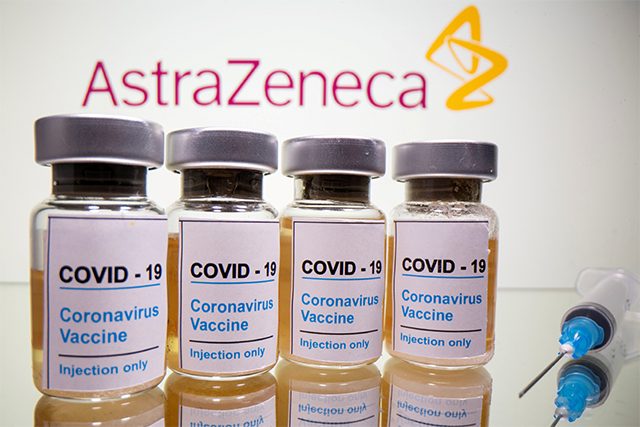
AstraZeneca said on Monday its vaccine for the novel coronavirus could be around 90% effective without any serious side effects, the latest drugmaker to unveil positive interim data in a scientific race to curb a global pandemic.
The vaccine developed by Oxford University was 90% effective in preventing COVID-19 when it was administered as a half dose followed by a full dose at least one month apart, according to data from the late-stage trials in Britain and Brazil.
Another dosing regimen showed 62% efficacy when given as two full doses at least one month apart, and the combined analysis from both dosing regimens resulted in an average efficacy of 70%.
Here are some reactions to the news:
British Prime Minister Boris Johnson
“Incredibly exciting news the Oxford vaccine has proved so effective in trials,” Johnson said on Twitter. “There are still further safety checks ahead, but these are fantastic results.”
British Health Secretary Matt Hancock
“We hope to be able to start vaccinating next month,” Hancock told BBC TV.
“The bulk of the vaccine rollout program will be in January, February, March. And we hope that sometime after Easter things will be able to start to get back to normal.”
He earlier told Sky News: “We’ve got 100 million doses on order and should all that go well, the bulk of the rollout will be in the new year.”
Hancock also said there was evidence in the report that the vaccine could reduce transmission of the disease.
“Now of course that would be very good news if confirmed, because obviously what we want to do is not only stop people from getting the disease but also stop its transmission,” he said.
Professor Andrew Pollard, Director of the Oxford Vaccine Group and Chief Investigator of the Oxford Vaccine Trial
“These findings show that we have an effective vaccine that will save many lives. Excitingly, we’ve found that one of our dosing regimens may be around 90% effective and if this dosing regime is used, more people could be vaccinated with planned vaccine supply.
“We also have a vaccine that is going to be easy to distribute if stored at fridge temperatures, and we can get it to every corner in the world. It’s already been manufactured in 10 different sites around the world to make sure that that can happen.”
Pascal Soriot, Chief Executive Officer, Astrazeneca
“This vaccine’s efficacy and safety confirm that it will be highly effective against COVID-19 and will have an immediate impact on this public health emergency. Furthermore, the vaccine’s simple supply chain and our no-profit pledge and commitment to broad, equitable and timely access means it will be affordable and globally available supplying hundreds of millions of doses on approval.”
Peter Horby, Professor of Emerging Infectious Diseases and Global Health, University of Oxford:
“The reported efficacy of 70% is an interim measure and as more data accrue we will get a better idea of the protection it affords. Importantly, from what we have heard the vaccine seems to prevent infection not just disease. This is important as the vaccine could reduce the spread of the virus as well as protect the vulnerable from severe disease.
The Oxford vaccine can be stored in the fridge, as opposed to the freezer like the other two vaccines, which means it is a more practical solution for use worldwide.”
Michael Head, Senior Research Fellow on Global Health, University Of Southampton
“These results are intriguing, with two different estimates of efficacy depending upon the dose used with the vaccine.
“These are provisional results that have not been peer-reviewed and the study is ongoing, so as with the other recent announcements from Pfizer and Moderna, we should be a little cautious about these findings. It’s not yet fully clear why a half dose and then a full dose was potentially more protective but if the final results continue to show this pattern of around 90% effectiveness, this would allow greater vaccine supply not just in the UK but also globally.”
Danny Altmann, Professor Of Immunology, Imperial College, London
“I think it is a real fool’s errand to start trying to pick these three (Pfizer/Moderna/Astra) apart on the basis of snippets of phase 3 data from press releases. For the bigger picture, my suspicion is that by the time we are a year down the line, we’ll be using all three vaccines with about 90% protection – and we’ll be a lot happier.” —Reporting by Guy Faulconbridge, Michael Holden, Kate Kelland, Sarah Young and Kate Holton; Editing by Raju Gopalakrishnan









